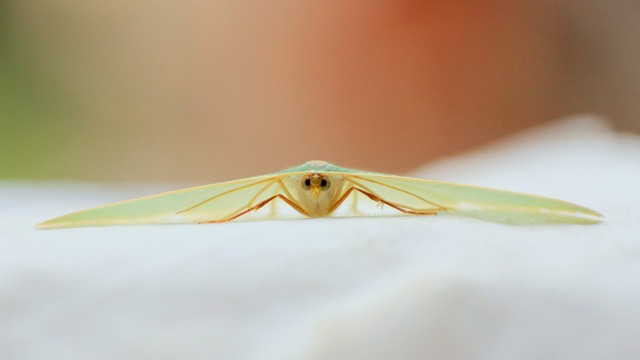Clothes moths, common household pests, cause significant damage to natural fiber fabrics. Professional moth extermination services offer eco-friendly solutions for both residential and commercial spaces using safe, natural products. Customized moth control plans tailored to each property ensure a moth-free environment, protect valuable items, and promote a greener lifestyle. These services avoid harsh chemicals, employing strategies like sanitization, cleanliness, and natural predators. Gaining popularity due to their effectiveness and minimal environmental impact, these eco-friendly solutions are available for clothes moths removal and commercial moth infestation treatment.
In the realm of pest management, addressing clothes moth infestations demands a delicate balance between effective removal and humane, eco-conscious methods. Traditional exterminations often leave behind residual chemicals, raising concerns for both health and the environment. This article explores tailored, eco-friendly solutions for both residential and commercial spaces plagued by these pesky moths. Discover how professional moth control services can eradicate infestations without compromising well-being or ecological balance, offering a sustainable approach to clothes moth management.
Understanding Clothes Moths: Behavior and Habitat
Clothes moths are a common household pest that can cause significant damage to fabrics and textiles. Understanding their behavior and habitat is crucial when it comes to effective clothes moth removal. These moths, often considered a nuisance, belong to the family Tineidae and are attracted to dark, undisturbed areas with high humidity levels. They primarily feed on natural fibers like wool, silk, cotton, and fur, making them a particular problem in homes with heavy drapes, carpets, furniture, and clothing stored for long periods.
Professional moth extermination services offer eco-friendly moth solutions for both residential and commercial spaces. Their experts design customized moth control plans tailored to the specific needs of each property. Unlike traditional methods that may involve toxic chemicals, these services use safe, natural products to eliminate moths and their larvae while preventing future infestations. By implementing such treatments, homeowners and businesses can enjoy a moth-free environment, protect valuable items, and contribute to a greener lifestyle.
Traditional vs. Eco-Conscious Moth Management Methods
In the battle against moths, traditional methods often involve harsh chemicals and extensive treatments, which can be detrimental to both the environment and non-target species. These conventional practices, while effective in the short term, may not be sustainable or desirable for those seeking more humane alternatives. On the other hand, eco-conscious moth management offers a holistic approach, prioritizing natural solutions and minimal environmental impact.
Eco-friendly methods aim to disrupt the moth life cycle through targeted interventions rather than widespread applications of pesticides. Professional services specializing in this area provide customized plans tailored to specific infestations, whether in residential or commercial settings. By employing strategies such as sanitization, cleanliness, and the introduction of natural predators or repellents, these eco-conscious solutions offer effective clothes moth removal while preserving the balance of nature.
Customized Moth Control Plans for Residential and Commercial Spaces
Many traditional moth management methods involve harsh chemicals that can be detrimental to both people and the environment. As such, there’s a growing demand for eco-friendly moth solutions that don’t compromise well-being or damage ecosystems. Customized moth control plans are at the forefront of this shift, offering tailored strategies for both residential clothes moth removal and commercial moth infestation treatment.
These plans consider unique factors like building structure, material composition, and local climate to implement the most effective yet safe methods. Professional moth extermination specialists employ techniques such as natural repellents, targeted treatments, and regular monitoring to prevent and eliminate cloth moth infestations without resorting to toxic pesticides. Clothes moth control services that focus on these customized plans ensure not only successful removal but also long-term protection for homes and businesses alike.
Implementing and Maintaining Eco-Friendly Moth Solutions
Implementing and maintaining eco-friendly moth solutions is an increasingly popular choice for both residential and commercial spaces aiming to rid themselves of clothes moth infestations. Instead of relying on harsh chemicals, professional moth extermination services now offer a range of safe and sustainable methods. These include using natural repellents, improving ventilation, and implementing customized moth control plans that target specific areas prone to infestation.
Many companies specialize in eco-conscious clothes moth removal, providing residential moth treatment and commercial moth removal services tailored to diverse needs. By adopting these innovative approaches, businesses and homeowners can effectively manage cloth moths while minimizing environmental impact and ensuring the well-being of occupants and nearby ecosystems.
In light of the above discussions on humane and eco-conscious approaches to moth management, it’s clear that combining traditional knowledge with modern, green practices offers the best path forward. By understanding the behavior and habitat of clothes moths, we can implement effective yet safe strategies for both residential and commercial spaces. Eco-friendly solutions like natural repellents, regular cleaning, and tailored control plans not only ensure clothes moth removal but also minimize environmental impact. For those seeking professional moth extermination services, opting for companies specializing in these eco-conscious methods ensures a comprehensive and long-lasting solution to clothing moth infestations without compromising health or sustainability.
